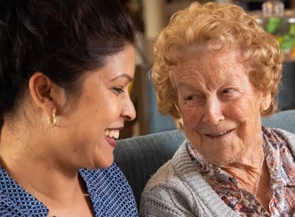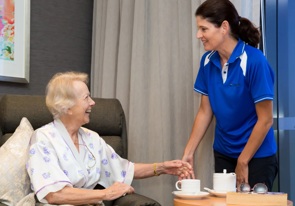Overview of Step 9 'Moving'
What if I need to sell the family home.
Handy Hint - Did you know that if you can click the CC at the bottom righthand side while the video is playing, captions will appear. To get rid of them, click CC again.
View transcript of video here9.1 Selling the family home
Our consistent advice is to commence the process of selling the family home early – at least 12 months before you expect to sell.
The first step is to get a no obligation valuation of the home plus advice on what repairs and other steps may be required to maximize the sale experience – a fast sale at a responsible price.
The valuation and advice establish a path to prepare the home; you have time to discuss and implement plans.
You will need;
- Title deeds to the property
- A solicitor to develop the contract and conveyancing
- Access to bank accounts to transact money
- Funds to pay for repairs and services
- Agreement with the seller on the decision to sell
- Enduring Power of Attorney to act on behalf of the seller if required
- Preferably, approval by the family to act on their behalf
The typical timeframe to sell a home is:
- Obtain a valuation implement a preparation plan – allow 3-6 months
- Appoint a solicitor and prepare contracts – allow 2 weeks
- Select and appoint a real estate agent – allow up to 4 weeks
- Final preparation of the house for sale – allow 4 weeks
- Sale process – allow up to 10 weeks...Funds available – allow 6 to 8 weeks from sale
Once the sale has been made, you will need to notify:
Utilities
- Electricity Account
- Gas account
- Mobile phone
- Home landline phone
- Internet provider
- Pay TV
Government Agencies
- Australian Electoral Commission
- Australia Post (redirection of mail)
- Centrelink (if you receive social security benefits)
- Australian Taxation Office
- Electoral Roll
- Roads and Maritime Services (driving license and car registration)
Medicare
- Local Council (rates)
- Local library (memberships)
- Medical
- Private health insurance
- General Practitioner
- Dentist
- Physiotherapist/chiropractor/osteopath
- Veterinarian
Other
- Family and friends
- Clubs, social groups, supported charities
- Facebook etc.
- Banks, Credit unions
- Insurance (car, home etc.)
- Finance (accountant, financial adviser)
- Lawyer
- Superannuation memberships
- Tolls, E- tags
- Store memberships and loyalty programs
and don't forget :
- Pet microchip registry

The valuation and advice establish a path to prepare the home, you have time to discuss and implement plans.
Brian White
Ray White Chairman
9.2 Legal documents needed at the time of the move
You should read the Aged Care Homes Tab Section 2 ‘Get Set Up’ for a comprehensive outline of recommended legal documents you should consider for the aged care journey.
In this section we review the paperwork required to support the actual move to an aged care home (nursing home) and other items to consider. If you yourself are making the move, it may be wise to gather together the required documents and other key items.
It helps if you can bring information on your life plus those treasured items that you enjoy having around you and which indicate to others who you are and the life that you have lived to this point. Remember, the aged care home (nursing home) will become just that, your ‘home’ and the staff will be ‘living’ with you and caring for you 24 hours a day, 7 days a week. They will want to know about ‘who you are’.
You are likely to need:
- Your Government assets and income test documents
- Evidence that you can afford the ongoing aged care fees
- Bank details for automatic payments
- Enduring Power of Attorney – to make finance, property and legal decisions
- Enduring Guardian – to make general health and lifestyle decisions
- Appointment as Nominee – to allow you to deal with the Government and Centrelink
- Advanced care directive – details your wishes for medical treatment if you can’t speak for yourself
- Instructions for your file – what you like and don’t like, for instance food or spiritual guidance
- Personal profile – your history so staff ‘know’ you, including anniversaries
- Full contact details of all relevant people – include medical specialists
- Medical history
- Personal effects for the room – for comfort and memories
Plus:
- Clothes and preferred toiletries
It is also wise to limit jewelry and cash that you bring as there will be residents that get confused. Ask the manager for advice.
Remember, the aged care home will become just that, your home and the staff will be 'living' with you and caring for you 24 hours a day, 7 days a week.























